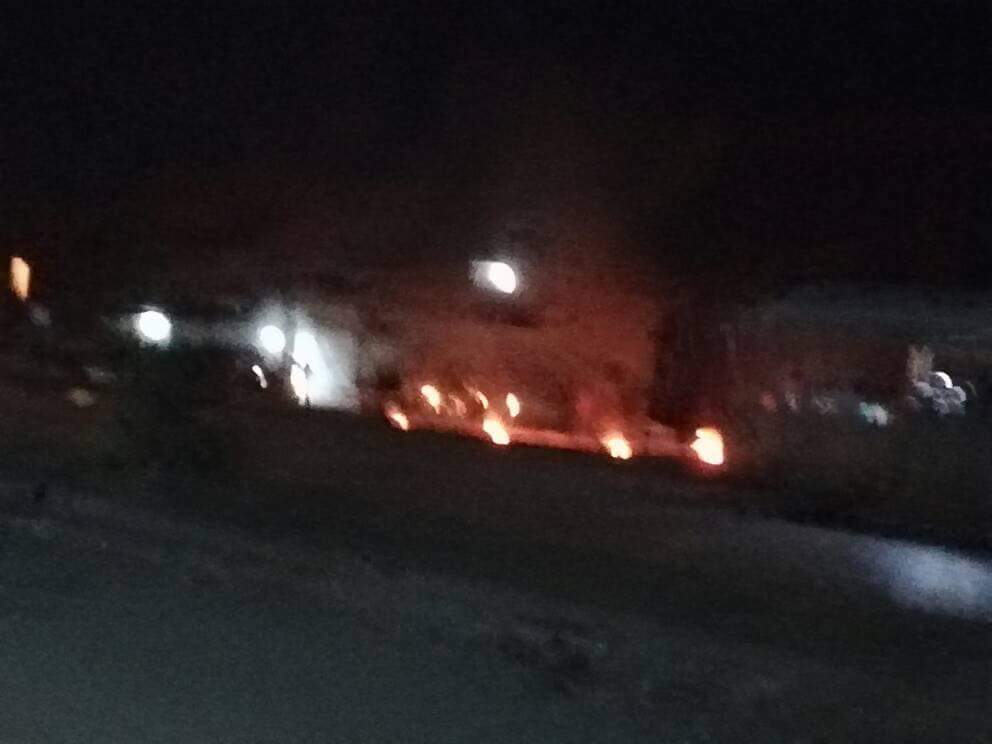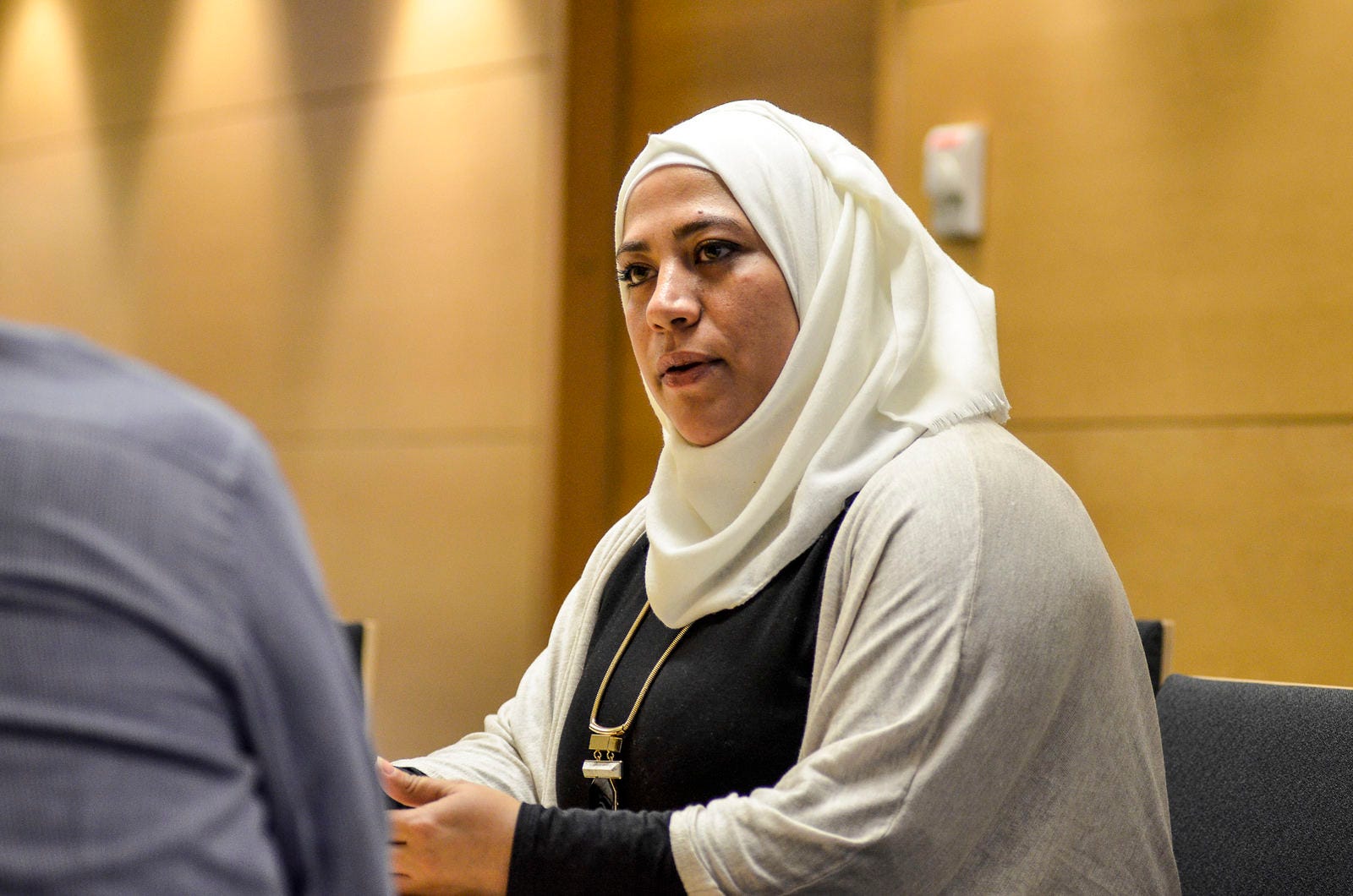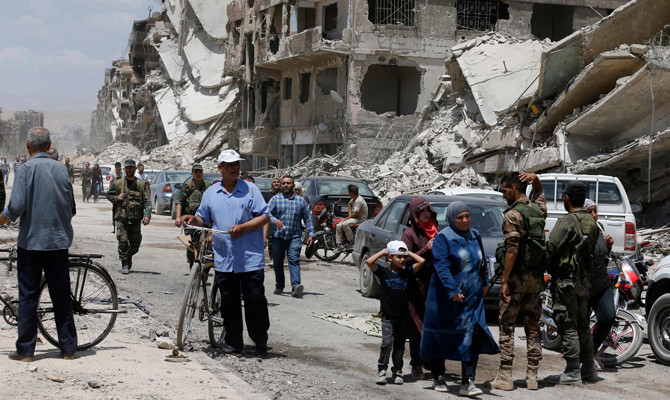
'Raqqa is witnessing developments not previously observed since it was declared controlled by YPG militia-dominated Syria's Democratic Forces (SDF) militias in 2017. As the popular demands for exiting the city increased, clashes broke out between the rebel and Kurdish protection militia (YPG) that the US-led International Coalition forces failed to stop such clashes. This comes in conjunction with preparing Saudi Arabia-backed Arabic forces to manage the region.
Kurdish protection militia YPG-dominated Syria's Democratic militias seized in October 2017 complete control over Raqqa after months of fighting against ISIS that ended with the complete destruction of the city, the displacement of most of its population and the killing and wounding of thousands of civilians. The YPG have imposed its laws, which led to compulsory recruitment and the resettlement of Kurds, and this is what the Syrian Arabs considered an attempt to change the region's demographics.
Public protests in the city of Raqqa have been going on for more than a week, demanding the end of the arbitrary arrests and forced recruitment implemented by Kurdish protection militias.
"Such demonstrations were caused by the militias' practices of theft and confiscation of civilian property, raids and random arrests, and the imposition of forced conscription, as well as the issuance of decisions and judgments and the administration of the city to suit their plans," media activist, Mohamed Othman, said.
Almost every day, evening demonstrations take place in the areas of al-Sakia Street, Dawar al-Barazi and al-Mashbal district. Although they are met with violence and repression, the protesters insist on their demands for the militia to withdraw and hand over the city to civilian bodies. Recently, a demonstration erupted in "Rumaila" street was attacked nearby the "al-Batani" square and the protesters were met with shooting, which resulted in the injury of some demonstrators lightly injured and the arrest of four of them.
In response to the popular movement in the city, the militias blocked cars with food aid from entering the Rumaila neighborhood, in a move described by the people of the city as "collective punishment."
"Such demonstrations were caused by the militias' practices of theft and confiscation of civilian property, raids and random arrests, and the imposition of forced conscription, as well as the issuance of decisions and judgments and the administration of the city to suit their plans," media activist, Mohamed Othman, said.
Almost every day, evening demonstrations take place in the areas of al-Sakia Street, Dawar al-Barazi and al-Mashbal district. Although they are met with violence and repression, the protesters insist on their demands for the militia to withdraw and hand over the city to civilian bodies. Recently, a demonstration erupted in "Rumaila" street was attacked nearby the "al-Batani" square and the protesters were met with shooting, which resulted in the injury of some demonstrators lightly injured and the arrest of four of them.
In response to the popular movement in the city, the militias blocked cars with food aid from entering the Rumaila neighborhood, in a move described by the people of the city as "collective punishment."
Clashes broke out last Sunday between the Al-Raqqa Revolution Brigade and Kurdish protection militias near the roundabout of al-Barazi, where the latter targeted civilian houses with heavy machine guns, coinciding with the roll-out of military reinforcements towards the district of Maslab to storm the area.
Osman explained that the protection militias represented by the forces of Asayish and its military police tried to arrest one of the military commanders of the Brigades of Raqqa in his home in the neighborhood of Rumaila and got a quarrel and loud voices before a number of elements of the brigade managed to assist the commander and then patrols withdrew towards the district's outskirts and called for support from the elements of "Syria's Democratic Forces" in conjunction with the deployment of the brigade's fighters at the entrances of the neighborhood.
He added: "Then the militias fired at the neighborhood, which led the brigade to respond in the same manner. Meanwhile, the civilians came out in dozens and then developed the situation until they became hundreds of protesters from the neighborhoods of Rumaila and al-Mashlab to demand the exit of Kurdish protection militia from Raqqa.
On the other hand, the leader of the brigade, "Abu Ismail al-Askari" declared that "Syria's Democratic Forces" are trying to pressure the brigade to dismantle and prove their selves the only force on the ground, stressing their willingness to resort to similar operations against them in the event of continued violations.
Osman explained that the protection militias represented by the forces of Asayish and its military police tried to arrest one of the military commanders of the Brigades of Raqqa in his home in the neighborhood of Rumaila and got a quarrel and loud voices before a number of elements of the brigade managed to assist the commander and then patrols withdrew towards the district's outskirts and called for support from the elements of "Syria's Democratic Forces" in conjunction with the deployment of the brigade's fighters at the entrances of the neighborhood.
He added: "Then the militias fired at the neighborhood, which led the brigade to respond in the same manner. Meanwhile, the civilians came out in dozens and then developed the situation until they became hundreds of protesters from the neighborhoods of Rumaila and al-Mashlab to demand the exit of Kurdish protection militia from Raqqa.
On the other hand, the leader of the brigade, "Abu Ismail al-Askari" declared that "Syria's Democratic Forces" are trying to pressure the brigade to dismantle and prove their selves the only force on the ground, stressing their willingness to resort to similar operations against them in the event of continued violations.
Despite the intervention of the international coalition more than once to calm the situation and force the militias to withdraw to the outskirts of Rumaila, but they have returned the attack.
"Syria's Democratic Forces" has been trying to get rid of any military entities that have Arab forces majority, where the village of Abu Hamam in the eastern suburb of Deir al-Zour witnessed earlier military confrontations between Syria's Democratic militias and the "Elite forces" of the al-Ghad Movement headed by Ahmad al-Jarba, before the American President's envoy to the International Coalition "Bret Magork" interfered to resolve the conflict.
The Arab Council of the Jazira and the Euphrates region, which is close to the al-Ghad Movement said that the Kurdish protection militias that control the decision in "Syria's Democratic Forces" reject the presence of any Arab faction in the region, because it poses a threat, especially in light of the refusal of members of the Arab tribes to join them.
The Council expressed its fear of an Arab-Kurdish sedition that foreshadows more Syrian bloodshed, and the region of the al-Jazira and the Euphrates remains open to all possibilities.
After the announcement of the representative of the Democratic Union Party (PYD) that the city of Raqqa after the expulsion of ISIS from the city will join its federal system, and a member of the Political Bureau of the Kurdish Democratic Party, "Azad Brazi" revealed the existence of the idea of establishing a federation of Manbij and Raqqa, Deir al-Zour after the entry of Arab forces backed by Saudi Arabia, pointing out that is now being discussed by the Syrian Democratic Council which is the political front of the SDF militia.
A delegation from Arab countries met with officials from the Syria's Democratic militias to form a nucleus of a new Arab force in northern and eastern Syria. According to the sources, the meeting was held between the leaders of the Sanadid forces, the Elite forces, the brigades of Raqqa and other Arab factions in Syria with officials of the Saudi Arabia, UAE and Jordan defense ministries, at the American-run base "Esh Kharabak" in the countryside of Ain Al Arab.
According to PassNews website, the Arab forces will be stationed initially only in the areas of Raqqa from which Washington withdraw its troops, which pressed the YPG to accept that step.
The source adds that the sheikh of the clan of Shammer "Hamidi Dahham Al Hadi" made an offer to participate in this force through the grouping of the Arab tribes and the formation of a Sunni tribal force with its capital (Raqqa) and under the supervision and support of Saudi Arabia.'
"Syria's Democratic Forces" has been trying to get rid of any military entities that have Arab forces majority, where the village of Abu Hamam in the eastern suburb of Deir al-Zour witnessed earlier military confrontations between Syria's Democratic militias and the "Elite forces" of the al-Ghad Movement headed by Ahmad al-Jarba, before the American President's envoy to the International Coalition "Bret Magork" interfered to resolve the conflict.
The Arab Council of the Jazira and the Euphrates region, which is close to the al-Ghad Movement said that the Kurdish protection militias that control the decision in "Syria's Democratic Forces" reject the presence of any Arab faction in the region, because it poses a threat, especially in light of the refusal of members of the Arab tribes to join them.
The Council expressed its fear of an Arab-Kurdish sedition that foreshadows more Syrian bloodshed, and the region of the al-Jazira and the Euphrates remains open to all possibilities.
After the announcement of the representative of the Democratic Union Party (PYD) that the city of Raqqa after the expulsion of ISIS from the city will join its federal system, and a member of the Political Bureau of the Kurdish Democratic Party, "Azad Brazi" revealed the existence of the idea of establishing a federation of Manbij and Raqqa, Deir al-Zour after the entry of Arab forces backed by Saudi Arabia, pointing out that is now being discussed by the Syrian Democratic Council which is the political front of the SDF militia.
A delegation from Arab countries met with officials from the Syria's Democratic militias to form a nucleus of a new Arab force in northern and eastern Syria. According to the sources, the meeting was held between the leaders of the Sanadid forces, the Elite forces, the brigades of Raqqa and other Arab factions in Syria with officials of the Saudi Arabia, UAE and Jordan defense ministries, at the American-run base "Esh Kharabak" in the countryside of Ain Al Arab.
According to PassNews website, the Arab forces will be stationed initially only in the areas of Raqqa from which Washington withdraw its troops, which pressed the YPG to accept that step.
The source adds that the sheikh of the clan of Shammer "Hamidi Dahham Al Hadi" made an offer to participate in this force through the grouping of the Arab tribes and the formation of a Sunni tribal force with its capital (Raqqa) and under the supervision and support of Saudi Arabia.'





